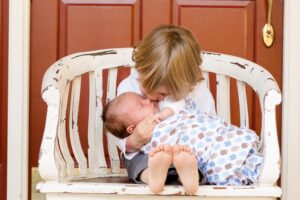
When you’re bringing home a bundle of joy (or are looking forward to a family or friend visit with little ones), safety is job number one. There are areas you may want to make off-limits or hazardous materials to move up and out of danger zones. General household changes include adjusting the water heater to avoid scalding temperatures or checking smoke alarms to ensure they’re properly working. One thing many people don’t think about is how a security system may help you babyproof your home.
Security Is Job 1 for a Safe Home
Before getting into the details, the first step is to ensure you have a safe and secure home. That means it’s protected from not only potential burglars or other intruders, it’s also protected against fires, floods, and other disasters that are dangerous for adults as well as children.
New parents virtually all experience sleepless nights (and the exhaustion that follows). So starting early (before the child arrives) can make it easier to babyproof your home. That said, there’s no time like the present to make your home more secure. Some of the top solutions include:
- A home security system to monitor your home 24/7.
- Smoke detectors in every room to alert you if there’s any sign of smoke or fire, so you can get your baby to safety. Smoke detectors can be included in a whole-home security system and even alert emergency services if you’re away from home.
- Carbon monoxide detectors to protect you from this invisible, odorless, tasteless gas that can lead to health complications and even death. This is particularly important if you have a fireplace or use some form of oil or gas to heat your home or cook your meals.
- Flood detector, which can alert you to unseen leaks in the basement or ground level as well as appliances like refrigerators, dishwashers, and washing machines.
- Automation can help add convenience to your home’s safety and can often integrate easily into your whole house system to make it safer, more comfortable, and even more affordable.

Babyproofing for Newborns
The fortunate thing about small, delicate newborns is that they’re not yet mobile. That means more of their safety is in your control. Simply ensuring the home, in general, is safe can increase their safety.
In addition, you can decrease risks by putting your baby to bed on their back and taking steps to prevent their face from being covered with blankets, pillows, or toys. You may, for instance, want to swaddle your baby or snuggle them into a sleep sack. You’ll also want to ensure they have a firm mattress with the crib sheet fully secured to prevent them from getting tangled.
Once your baby starts to roll, you’ll want to avoid placing them on any surface they can roll off when they aren’t supervised. That can include a couch, bed, open crib, or changing table. Don’t wait until your baby can roll over as they may roll over for the first time off a high surface.
For babies sleeping in another room at night or during naps, it can also help to have a baby monitor. These allow you to keep your eyes and ears on your baby as they sleep, yet they allow you to move through the house to take care of other business.

Baby Proofing for Bigger Babies
Once your baby becomes mobile—i.e., learns to crawl, scoot, or roll around—it’s game on! You can never predict how quickly your baby can go from tummy time to five feet away to a full-on run. Before your baby hits that stage, it’s time to scrutinize your home with safety in mind. For instance, you may need to:
- Install baby gates, especially at the top and bottom of stairs or into areas of the home that are off-limits.
- Remove any cords they can get tangled in, such as on window blinds.
- Soften sharp edges, such as on coffee tables and fireplace surrounds.
- Barricade fireplaces, swimming pools, hot tubs, and other potentially hazardous areas, so children can’t easily stumble and get hurt.
- Properly secure bookcases, curio cabinets, dressers, and other tall furniture that could tip over.
- Install baby locks on cabinets, cupboards, and drawers, especially if they contain potentially dangerous items, such as choking hazards or hazardous cleaning or art supplies. Remember, babies explore the world via their mouths. Make sure they don’t have easy access to grab something that shouldn’t be in their mouths, including dog toys and bones, coins, pens and pencils, etc.
- Raise houseplants, which can be harmful if ingested or just a big mess to clean up if knocked over.
How Your Security System May Help You Babyproof Your Home
Who hasn’t found their small child playing with a phone, only to access something they shouldn’t (e.g., calling emergency services)? Ensuring your phones, smart devices, and control panel are locked away from curious fingers can help prevent false alerts.
You can, however, also use your security system to help babyproof your home. For example, indoor security cameras can help you monitor your baby and keep tabs on them easily through your smartphone app. For small children, this may give you the freedom to leave them momentarily for a run to the restroom. And as they become more independent, you can use a security camera in their bedroom or playroom to ensure they’re safe as you prepare dinner or visit with your partner or friend.
Your security monitor may also have two-way communication, so you can speak with your child from another room. Or, they can alert you if they need something. They can also allow you to check in with other caregivers when you’re away from home (and provide recordings if there are any questionable interactions).
Finally, your security sensors can help you monitor if doors or windows are being opened, so you can ensure their curious bodies aren’t going outside without your knowledge. Motion sensors can also alert you if a child has broken through a baby gate and is getting ready to stumble up or down stairs.
An ADT (now Telus) monitored alarm system from Alarm Guard adds another layer of security as you babyproof your home. They can even integrate into your smart device, so you can get relevant alerts for every stage of your baby’s life. Plus, it could help you save on homeowner’s insurance! Check out our packages and call now for a free quote at 1-855-518-4458 and talk with an expert about the best home security solutions for you and your growing family.
